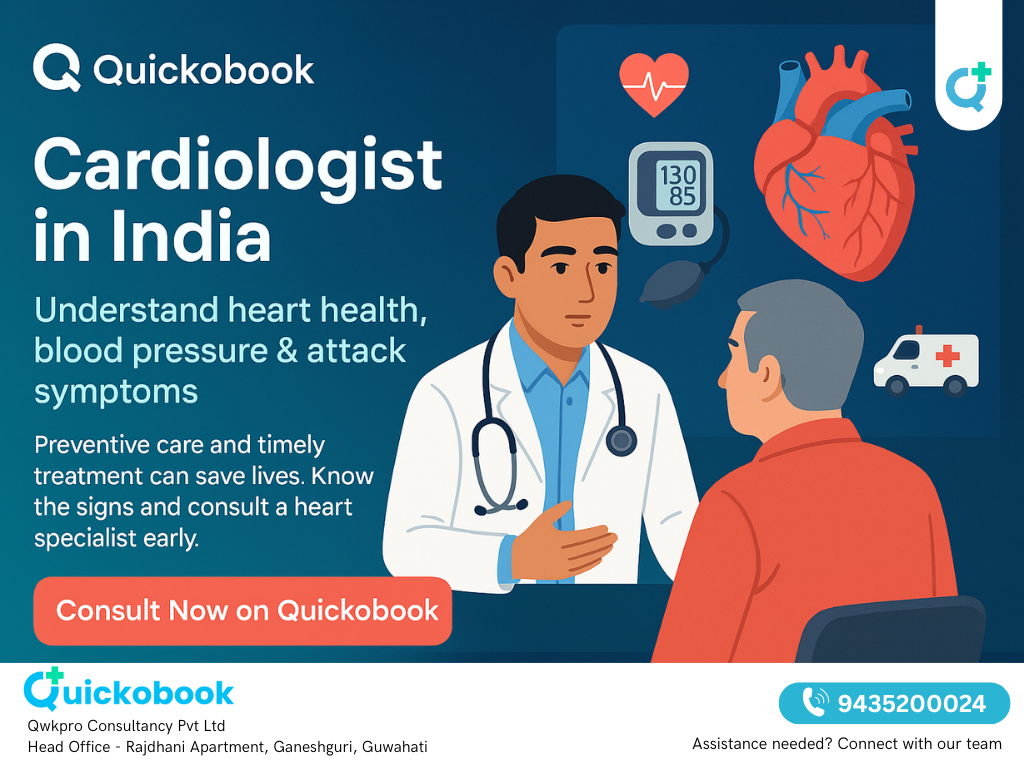Introduction
Your heart is the powerhouse of your body, pumping blood and oxygen every second. But in India, heart disease is now one of the leading causes of death, affecting both young and old. High blood pressure (hypertension) and heart attacks are rising due to stress, lifestyle, and poor dietary habits.
A cardiologist is the doctor who specializes in treating heart conditions. From regular heart check-ups to life-saving procedures, cardiologists play a key role in protecting your heart health. In this blog, we’ll explain everything about cardiology, common heart issues, prevention tips, and when to see a heart specialist.
What is a Cardiologist?
A cardiologist is a medical doctor trained to diagnose, treat, and prevent heart and blood vessel diseases. They treat conditions like:
- High blood pressure
- Heart attack
- Heart failure
- Arrhythmia (irregular heartbeat)
- Coronary artery disease
- High cholesterol
They also perform tests such as ECG, echocardiogram, stress test, and angiography.
Causes of Heart Disease in India
- High blood pressure: Uncontrolled BP damages arteries.
- Diabetes: Increases risk of heart attack and stroke.
- Smoking and alcohol: Weakens the heart and blood vessels.
- High cholesterol: Leads to artery blockages.
- Obesity & poor diet: Junk food and lack of exercise raise risks.
- Stress: Chronic stress increases BP and heart strain.
Symptoms to Watch Out For
See a cardiologist if you notice:
- Chest pain or tightness
- Shortness of breath
- Dizziness or fainting
- Rapid or irregular heartbeat
- Swelling in legs or ankles
- Uncontrolled blood pressure
- Fatigue during simple activities
Diagnosis of Heart Problems
Cardiologists use modern tests to detect issues early:
- ECG (Electrocardiogram)
- Echocardiogram
- Stress test (Treadmill test)
- Holter monitoring
- Angiography
- Blood pressure monitoring
Treatment Options by Cardiologists
- Medicines: To control blood pressure, cholesterol, and rhythm problems.
- Angioplasty & stents: To open blocked arteries.
- Bypass surgery: For severe blockages.
- Pacemakers: For irregular heartbeats.
- Lifestyle advice: Diet, exercise, stress control.
Lifestyle & Prevention Tips
- Eat a balanced diet (fruits, vegetables, less salt & oil).
- Maintain a healthy weight.
- Exercise 30 minutes daily.
- Quit smoking and limit alcohol.
- Get regular blood pressure and cholesterol checks.
- Manage stress with yoga or meditation.
When to See a Cardiologist
You should consult a heart specialist if:
- You have persistent high blood pressure.
- Family history of heart attacks or sudden cardiac deaths.
- You have diabetes plus chest pain.
- Your cholesterol is high.
- You feel breathless while climbing stairs or walking short distances.
READ ALSO: Which Intermittent Fasting Plan Is Right For You?
Risks & Complications if Ignored
Untreated heart conditions can lead to:
- Stroke
- Severe heart attack
- Kidney damage (due to BP)
- Heart failure
- Sudden cardiac arrest
Conclusion
Your heart deserves regular care, just like any other organ. Seeing a cardiologist for timely check-ups, controlling blood pressure, and preventing heart attacks can save lives. Prevention is always better than emergency treatment.
Book an appointment with the best cardiologist near you on Quickobook today for heart check-ups, blood pressure management, and expert cardiac care.
50 FAQs on Cardiologist, Blood Pressure & Heart Attacks
Q1. What does a cardiologist do?
A cardiologist treats heart and blood vessel problems.
Q2. When should I see a cardiologist?
If you have chest pain, shortness of breath, or high blood pressure.
Q3. Can high blood pressure cause a heart attack?
Yes, uncontrolled BP damages arteries and increases heart attack risk.
Q4. Is ECG enough to detect heart problems?
It helps, but sometimes echo or angiography is needed.
Q5. What is the normal blood pressure?
120/80 mmHg is considered normal.
Q6. Can stress cause heart attack?
Yes, chronic stress raises BP and heart strain.
Q7. How often should I get a heart checkup?
Once a year after age 35, or earlier if you have risk factors.
Q8. What foods are good for heart health?
Fruits, vegetables, whole grains, nuts, and low-oil cooking.
Q9. Can young people get heart attacks?
Yes, rising cases in India show even people under 40 are affected.
Q10. Does family history increase risk?
Yes, genetics play a role in heart disease.
Q11. Is high BP always a sign of heart disease?
Not always, but it increases future risk.
Q12. Can exercise reduce blood pressure?
Yes, regular physical activity lowers BP naturally.
Q13. How is a heart attack different from cardiac arrest?
Heart attack = blocked artery; cardiac arrest = heart stops beating.
Q14. What is angioplasty?
A procedure where a balloon and stent open blocked arteries.
Q15. Can a cardiologist help with cholesterol?
Yes, they prescribe medicines and lifestyle changes.
Q16. How does diabetes affect the heart?
It damages blood vessels and doubles heart attack risk.
Q17. Can smoking damage the heart?
Yes, smoking narrows arteries and causes BP rise.
Q18. How is blood pressure tested?
Using a sphygmomanometer or digital BP monitor.
Q19. Can heart problems be cured permanently?
Most need lifelong management, not a one-time cure.
Q20. Is bypass surgery safe?
Yes, it is a common and life-saving operation.
Q21. Can yoga improve heart health?
Yes, yoga lowers stress and blood pressure.
Q22. What are silent heart attacks?
Heart attacks without typical chest pain, often in diabetics.
Q23. Can women have different heart attack symptoms?
Yes, nausea, fatigue, or back pain may occur.
Q24. Are home BP monitors reliable?
Yes, if used correctly.
Q25. What is a pacemaker?
A device to regulate slow or irregular heartbeat.
Q26. Can heart disease be reversed?
Lifestyle changes can slow or improve early disease.
Q27. Does alcohol affect the heart?
Excess drinking raises BP and weakens heart muscle.
Q28. Can stress tests detect blockages?
Yes, they show how the heart works under pressure.
Q29. How much salt is safe for BP patients?
Less than 5 grams (one teaspoon) daily.
Q30. Can obesity cause high BP?
Yes, excess weight strains the heart.
Q31. What is cardiac arrest first aid?
CPR (chest compressions) and immediate medical help.
Q32. Can pregnancy affect BP?
Yes, some women develop gestational hypertension.
Q33. Is cholesterol always harmful?
No, LDL is bad, HDL is good for the heart.
Q34. Can lack of sleep cause BP issues?
Yes, poor sleep raises BP and stress hormones.
Q35. How is heart failure treated?
Medicines, lifestyle changes, and sometimes surgery.
Q36. Do cardiologists treat stroke?
They mainly treat heart disease; neurologists handle stroke.
Q37. Can BP medicines be stopped?
Only if your doctor advises, never on your own.
Q38. What is the cost of angioplasty in India?
Ranges from ₹1.2 lakh to ₹2.5 lakh in private hospitals.
Q39. Is walking enough for heart health?
Yes, 30 minutes brisk walk daily is very beneficial.
Q40. Can thyroid issues cause BP problems?
Yes, thyroid imbalance affects heart rate and pressure.
Q41. What is the difference between a cardiologist and a cardiac surgeon?
Cardiologist = medical treatment; surgeon = heart operations.
Q42. Can dehydration affect BP?
Yes, low fluids can drop BP suddenly.
Q43. Do children need cardiologists?
Yes, pediatric cardiologists treat congenital heart defects.
Q44. What is angiography?
An imaging test to see blocked heart arteries.
Q45. How does high BP affect kidneys?
It damages kidney blood vessels, leading to failure.
Q46. Can mental health affect the heart?
Yes, depression and anxiety worsen heart disease risk.
Q47. How soon should I see a doctor after chest pain?
Immediately—call emergency services.
Q48. Can heart attacks be predicted?
Not always, but risk factors can be controlled.
Q49. Do cardiologists recommend supplements?
Only if needed—better to rely on a healthy diet.
Q50. Can Quickobook help me find a cardiologist?
Yes, Quickobook connects you with trusted heart specialists near you.
Quickobook CTA:
Search cardiologist appointment near me today for blood pressure control, heart attack prevention, and expert cardiac care.
Disclaimer: This blog is for educational purposes only. It does not replace medical advice. Always consult a qualified cardiologist for diagnosis and treatment.










Comments (0)
No comments yet. Be the first to share your thoughts!
Leave a Comment